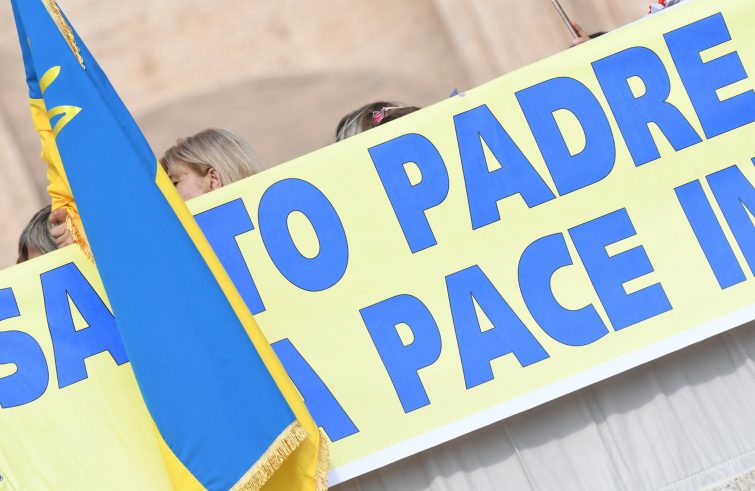
“I pray that all the parties involved refrain from any action that would cause even more suffering to the people, destabilising coexistence between nations and bringing international law into disrepute.” The Pope made yet the umpteenth appeal for peace in Ukraine at the end of Wednesday’s general audience in Paul VI Hall, the first of a cycle of catechesis dedicated to old age. “Despite the diplomatic efforts of the last few weeks – Francis denounced – increasingly alarming scenarios are opening up. Like me, many people all over the world are feeling anguish and concern. Once again the peace of all is threatened by partisan interests. I would like to appeal to those with political responsibility to examine their consciences seriously before God, who is the God of peace and not of war; who is the Father of all, not just of some, who wants us to be brothers and not enemies.” Addressing his appeal to “believers and non-believers alike”, the Pope called on everyone to make next March 2, Ash Wednesday, a Day of Prayer and Fasting for Peace: “Jesus taught us that the diabolical senselessness of violence is answered with God’s weapons, with prayer and fasting. May the Queen of Peace preserve the world from the madness of war.”
“Together with migration, old age is one of the most urgent issues facing the human family at this time”,
the Pope said at the beginning of his catechesis. “There have never been so many of us in human history,” Francis pointed out, and “the risk of being discarded is even more frequent”, as “the elderly are often seen as ‘a burden’.” “In the dramatic first phase of the pandemic it was they who paid the highest price”, the Pope noted: “They were already the weakest and most neglected group: we did not look at them too much when they were alive, we did not even see them die.” “Is there friendship, is there cooperation between the different stages of life, or do separation and being discarded prevail?”, is the question we should ask ourselves: “We all live in a present where children, young people, adults and the elderly coexist. But the proportion has changed: longevity has become mass and, in large parts of the world, childhood is distributed in small doses”, the reference to the demographic winter: “an imbalance that has many consequences.” In unscripted remarks, the Pope invited the faithful to read the Charter on the rights of the elderly and the duties of the community, drawn up by the Senior Citizens’ Health and Social Care Reform Commission at the Ministry of Health.
“The exaltation of youth as the only age worthy of embodying the human ideal, coupled with contempt for old age as frailty, decay, disability, has been the dominant image of twentieth-century totalitarianism.
Have we forgotten this?”, the Pope asked: “Perhaps the elderly need to apologise for their stubbornness in surviving at the expense of others? Or can they be honoured for the gifts they bring to everyone’s sense of life?”.
“For an age that is now a decisive part of the community space and extends to a third of the entire life span, there are – at times – care plans, but not projects of existence”,
Francis denounced. “And this is a void of thought, imagination and creativity”, added the Pope, condemning the thinking whereby old age is regarded as “an age that has no special content to offer, nor meaning of its own to live.” “Youth is beautiful, but eternal youth is a very dangerous illusion”, the Pope warned: “Being old is just as important – and beautiful – is equally important as being young. Let us remember this. The alliance between generations, which restores all ages of life to the human, is our lost gift and we have to get it back. It must be found, in this culture of waste and in this culture of productivity.”
“If grandparents fall back on their melancholies, young people will look even more to their smartphones. The screen may stay on, but life will die out before its time”,
is Francis’ cry of alarm. The Holy Father once again cited the prophecy of Joel: “Your elders shall dream dreams, your young men shall see visions.” “Isn’t the most serious backlash of the pandemic precisely in the feeling of loss of the young?”, the Pope asked: “The old have resources of life already lived that they can call upon at any moment. Will they stand by and watch young people lose their vision, or will they accompany them by warming their dreams? Faced with the dreams of the old, what will the young do?”. “The wisdom of the long journey that accompanies old age to its close must be experienced as an offer of meaning to life, not consumed as the inertia of its survival”, the Pope’s guidance: “If old age is not restored to the dignity of a humanly worthy life, it is destined to close itself off in a despondency that robs everyone of love.”
“Everything beautiful that a society has is related to the roots of the elderly. For this reason, in these catecheses, I would like the figure of the elderly person to come up, to understand well that the elderly person is not a waste material: he/she is a blessing for society.”
These words, delivered ad lib, concluded Francis’ first audience dedicated to old age. “I hope that in the dialogue between young and old, the old can provide dreams and the young can receive them and carry them forward”, is the Pope’s wish with regard to the “bridge” connecting the elderly and the young, a bridge that “will be the transmission of wisdom in humanity.”










